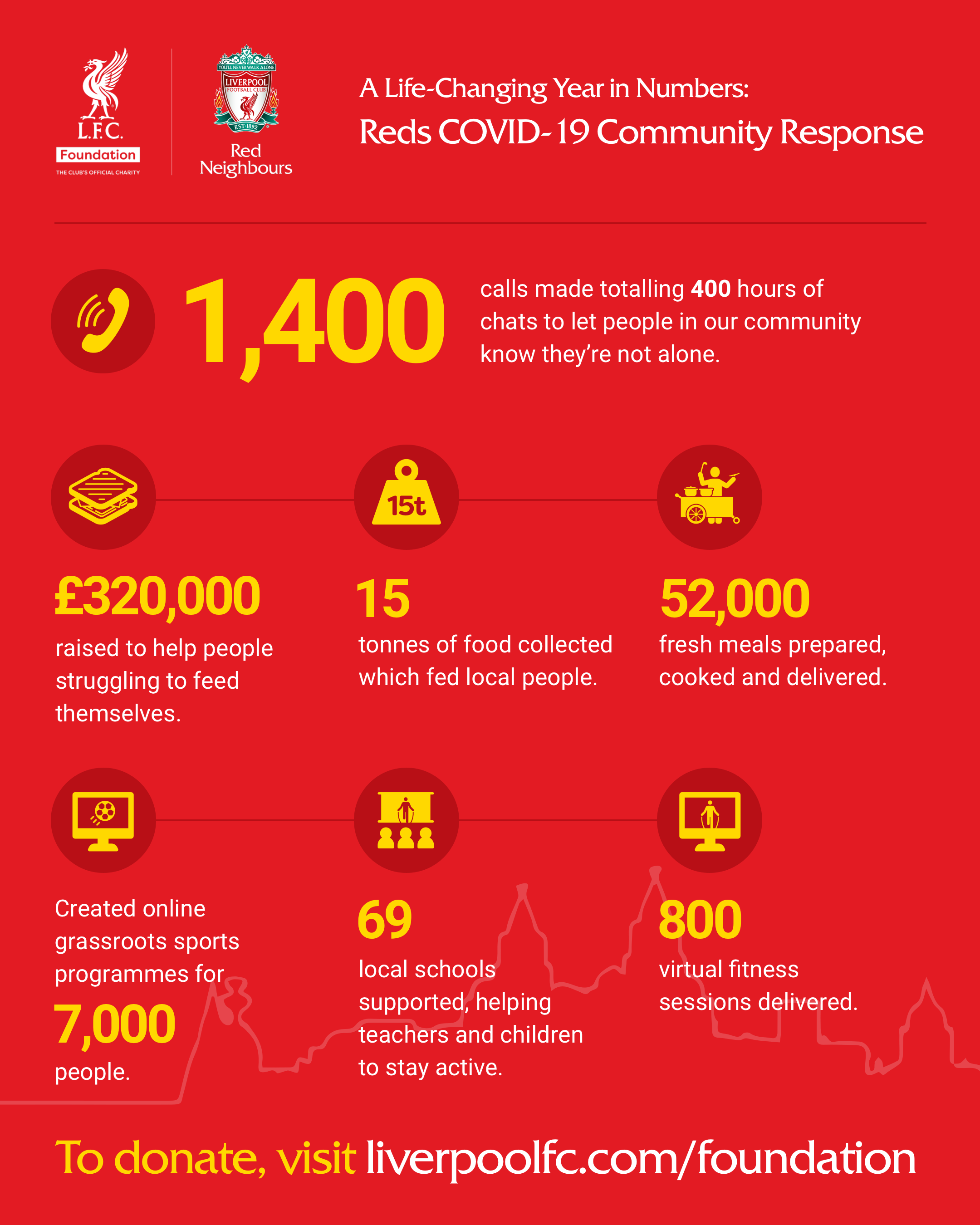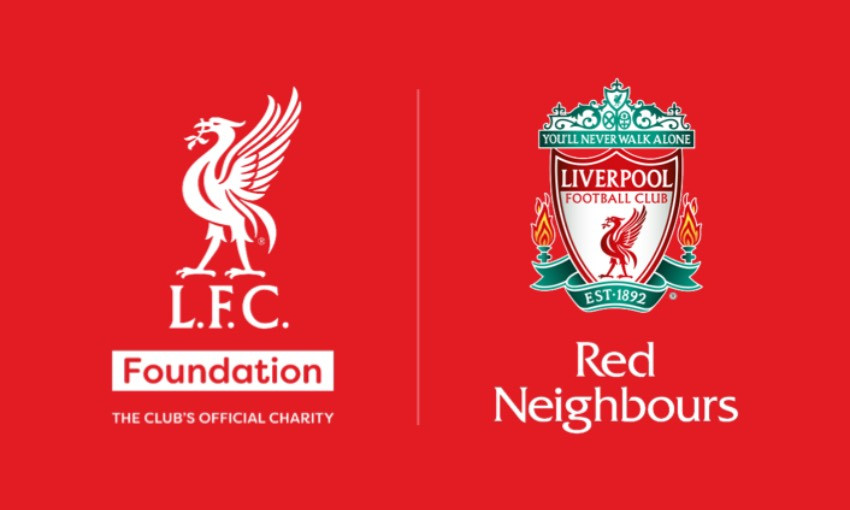A life-changing year in numbers: LFC's COVID-19 community response
Supporting the community isn't new for LFC Foundation and Red Neighbours – yet the requirement throughout the COVID-19 pandemic for even the most basic of needs has become the main focus for the staff and volunteers.
Social isolation, food poverty and wellbeing were soon identified as the three main areas of need in the local community when the lockdown began last March.
- Wellbeing: We supported the physical and mental health of our communities by delivering 800 virtual fitness sessions, created online grassroots sports programmes for 7,000 children and supported 69 local schools, helping teachers and children to stay active.
- Social isolation: We made 1,400 calls totalling 400 hours of chats to let people in our community know they’re not alone.
- Food poverty: We raised £320,000 to help people struggling to feed themselves; prepared, cooked and delivered 52,000 fresh meals to families, and collected more than 15 tonnes of food which fed local people.

Understanding the positive difference the free lifeline sessions LFC Foundation and Red Neighbours make, as well as the potential impact on the mental and physical health of the children, families and elderly participants without them, meant maintaining face-to-face participation was essential wherever possible. As the grip of the virus progressed, taking this provision online was crucial.
This year has seen 800 free virtual sessions delivered. Every grassroots football, physical activity and sports-related session has gone online, with more than 7,000 participants in the last 12 months. And LFC Foundation has supported 69 schools across the Liverpool City Region, helping teachers and children to stay active and motivated whether they are in school or home schooling.
Matt Parish, LFC Foundation chief executive officer, said: “The impact on the physical and mental wellbeing of communities as a result of the last year is unlikely to see its own peak for some time yet. We knew some people would find it tough to suddenly go from a few sessions a week in-person to purely virtual participation, and especially the kids and elderly members of our communities.
“The work we have done around children’s mental health within the LFC Foundation recognises that grassroots sports sessions do have an impact on the wellbeing of young people and need to get back to normal as quickly as possible.
“Taking that step into virtual delivery has certainly had its benefits. Our programmes are now accessible to so many people who might not have been able to come down to a session before and it’s certainly something we will continue with when the world returns to some sort of normality.”
For the more senior members of the community, the move to a virtual world of provision has certainly been a positive experience.
Chair-based yoga used to take place once a week at Anfield but the pandemic moved this provision online, too. The club created workshops teaching elderly participants how to video conference and soon the demand for more yoga had bumped the classes to three times per week – not only improving wellbeing but offering an avenue for new and old friends to keep in touch and continue to share their life experiences.
“I know several of our yogis have commented on how the pandemic has actually helped with their yoga practice!” Parish said. “They’ve done more sessions than they would have before, meaning they’re stronger and steadier on their feet.”
With a growing elderly population, the Anfield community has long suffered with aspects of social isolation – something Red Neighbours’ walking football, chair-based yoga and the pure joy of the over 50s Monday club sought to appease.
Now amidst the pandemic, the problem of isolation has only been exacerbated and even more members have been welcomed to the club than ever before. It became clear there was a need for a ‘virtual cuppa’ service long before the onset of COVID-19. The service was in the pipeline but the pandemic brought the immediacy of that need to the fore.
Since it was launched in March last year, LFC Connect has made more than 1,400 calls. Staffed by club employees who volunteer their time to have a friendly chat with members of the community who are either cut off from family or friends, or isolating to keep themselves safe, in the past 12 months the service has clocked up more than 400 hours of conversations.
Safeguarding-trained, the volunteers have referred vulnerable members of the community to external agencies, celebrated birthdays and comforted when times have been tough, and even welcomed Jürgen Klopp, Andy Robertson, Virgil van Dijk, as well as countless former players, as volunteers on the phones.
Club partners have also offered an extra line of defence across the board, donating food, making donations and organising initiatives which have helped to bring a smile to the faces of those enduring isolation.
“A period in our lifetime like no other has created a vacuum in our communities which has left people hungry, struggling with their physical and mental wellness and deteriorating without human contact,” said Parish.
“We all know the impact of a friendly voice at the end of the phone, but if that was the only person you’d spoken to that day or even that week, that impact will be hugely amplified. LFC Connect has filled a void for many people but enabled our staff volunteers to get to know the issues facing our community so much better in the process.”
Battling food poverty has been a core theme of activity for the club’s Red Neighbours team since it began four years ago. By facilitating foodbank collections at each game with Fans Supporting Foodbanks, the small team has collected 37.5 tonnes of food for families in need.
When games were paused, the impact on foodbank collections posed an immediate threat to the people that relied on the donations to feed their families.
Parish added: “Access to food and the ability to feed your family is something many people take for granted but the need is ever-present and reliance on foodbanks has certainly increased since the beginning of the pandemic. Ensuring foodbanks were well-stocked from the outset was a core priority of our community response work from the very beginning.”
In the last 12 months, almost £320,000 has been raised thanks to the generosity of fans to support foodbanks, and 15.5 tonnes of food has been donated during the pandemic alone. Fifteen community pantries have been introduced around the Liverpool City Region with the support of the club and its partners, which will provide a sustainable long-term option and a dignity of choice for those who will continue to carry the burden of the pandemic with them for years to come.
For the LFC Foundation and Red Neighbours programme, the wealth of pre-COVID-19 community work is almost a distant memory when faced with the growing strain on families across the city, yet it is this embedding within its communities which has enabled it to be so responsive when faced with a crisis of this size.
Parish concluded: “Even before the pandemic struck, our work across all of the communities we support was absolutely required and I think it’s these long-standing relationships which enabled us to react quickly as the inevitability of the pandemic developed, to prop up those areas where we knew people would need it most.
“Although we’re immensely proud of our staff and volunteers for wrapping their arms around the community to this extent, none of these achievements from the past year are to be celebrated. They are a heart-breaking reflection of the devastating impact the pandemic has had on our people and reinforce the reason we all go to work every day.”



